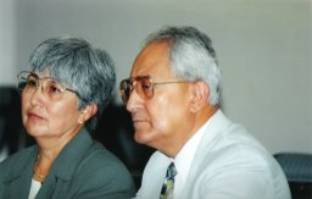|
|
The Voice of the Elderly Hispanic Community
By the National Hispanic Council on Aging
November 29, 2004

"My first priority is to raise national awareness of the increasing critical issues facing the Hispanic elderly - to give them a voice," said Yanira L. Cruz when she was president of the National Hispanic Council on Aging (NHCOA). "Poverty remains disproportionately high among Hispanic elderly. In addition, the Latino elderly, which is increasingly becoming a larger proportion of our nation's population, is severely underrepresented in health care access."
According to the U.S. Census, the number of elderly increased elevenfold between 1900 and 1994, while the general population has only tripled. The number of elderly among the Hispanic population, which is expected to triple by 2050, will also swell. The Hispanic elderly population is expected to jump fourfold, from 4 percent of the total elderly population in 1990 to 16 percent by 2050, according to the U.S. Census. "Many Americans are living longer, and the health problems facing Hispanics will only grow if left untreated, crippling younger generations and perhaps society," Cruz said.
Hispanic senior citizens face an increasing number of chronic illnesses, lack of housing, jobs and the ability to buy food, clothing and basic necessities, NHCOA says.
"For example, many Latinos can't afford basic prescription drugs, so they are going to Tijuana and other border towns to buy medicine for less. But the quality of medication there may not be the best," Cruz said. "We have to address these and other problems."
The health care industry also is ill prepared to deal with the demands of this emerging population, including offering culturally and linguistically appropriate services. "We're calling on the government and health care policymakers to help us serve this population," Cruz said. "This is a crisis."
To do its part, NHCOA brings its national outreach to different regions of the country. For example, NHCOA offers low and moderate income housing to older Hispanics at Casa Iris in Washington, DC, and Mira Vista in Garden City, KS, to prevent their premature and unnecessary institutionalization.
"Many Latino elderly are falling behind with technology," Mendoza said. "We need to help educate them by reaching out to them in their communities, churches and groups and teach them about computers so they can communicate with their families and government agencies on Medicare and other critical issues."
In Washington, Casa Iris will begin offering classes soon so Hispanic seniors can learn to use a computer. "We're going to put 15 computers into Casa Iris and bring everyone there into the 21st century," Mendoza said. "We're hoping they will learn how to communicate more inexpensively and more frequently with their family members."
Family plays a central role for Latinos and contributes to a healthier and longer life for them - nearly four years more than their counterparts. The Latino culture and lifestyle - including strong ties to family and community and an active spiritual and work life - are positive influences in the health status of elderly Latinos.
Based in Washington, DC, NHCOA is dedicated to improving the quality of life for Hispanic elderly and their families and communities through public policy, education and community-based programs. NHCOA is a member-based, nonprofit organization with 35 affiliates and chapters across the United States. Established in 1979, NHCOA focuses on keeping its national members informed on critical issues for Latino seniors, particularly pertaining to health, income, education, employment, housing, strengthening families and building communities. For more information, please visit nhcoa.org.
|
|



